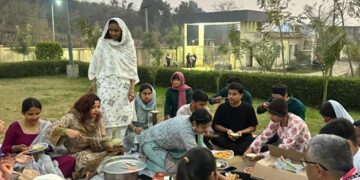By: Mohd Younus Bhat
There was a time—not too far in the past—when our world revolved around a single hall in a humble home. That space, worn with use and love, held more stories than the years could count. It was not just a room; it was a sanctuary of struggles and simple joys. Our nights were illuminated not by bulbs or tubes, but by the soft, amber flicker of a kerosene lantern perched on a rusty nail or placed atop an upturned brass bowl. That glow wrapped itself around our little world like a shawl. It flickered on our father’s-tired eyes, caught the curves of mother’s busy hands, and reflected off the worn pages of our schoolbooks, the fountain pens and Nataraj pencils so much popular in those days. The room never truly slept. There was always a rustle—the scratch of pencil on paper, the clicking of a fountain pen, the whispered mumbling of school lessons, or the steady clink of mother’s fingers weaving wet grass into wagoo, patijj, and cheongzii (All are different versions of handmade grass mats) on her wicker basket (foue’t or kranjou’l). Every sound had rhythm. Every silence, a purpose. The occasional cough echoed into the corners—dry, deep, familiar—like a lullaby born of cold air and lamp smoke. But none of it felt like burden. It was simply life, and we lived it with a quiet grace.
We siblings were all lured by the ultimate bait—Lipton chai—if only we could keep our eyes open long enough to study late into the night. The promise sounded grand, like a royal reward for academic bravery. But truth be told, we rarely made it to the heroic hour of 11 p.m. Despite our best intentions, our eyelids betrayed us. After full days spent playing cricket with torn tennis balls, chasing imaginary goals, and running from one end of the village to the other in search of absolutely nothing (except maybe a good excuse to stay out longer), our little bodies would surrender to sleep without warning.
We were innocent souls with tender hearts, more loyal to dreams than to textbooks, and before long, we would be snoring softly while our books lay open like unfinished promises. The Lipton chai? Often, it remained unclaimed—still steaming in mother’s kettle, a silent witness to yet another night where childhood triumphed over caffeine.
Electricity had not yet found its way to our village. The switchboards remained ornamental, untouched. Communication meant word-of-mouth, neighbour to neighbour, or notes passed through time-worn hands. But inside our four walls, something brighter than electricity flickered—we had each other. We had warmth stitched into the layers of patched quilts, into the steaming cups of tea, into the comfort of shared breath on freezing nights. Love did not come in grand declarations. It came through unspoken gestures: a shawl pulled over a child’s shoulder, a shared roti between siblings, a father staying awake so a child could read under the lantern just a little longer. Our life was frugal, yes, but it was full—not of things, but of people who never gave up on each other.
My father—tall in silence, steadfast in labour—was a man of incredible patience. His fingers, calloused yet tender, moved with quiet determination as he worked his embroidery frame. Hunched over for hours, he would let the lantern guide his needle, weaving delicate flowers, borders, and motifs, one thread at a time. His artistry was born not from leisure, but from necessity—and yet, each piece held beauty, a quiet protesttopoverty. He did not need to speak; his devotion spoke louder than words ever could. He did not chase riches. Each finished shawl, each design completed under that flickering light, was enough to tell us he loved us. That embroidery frame was not just a tool—it was a canvas of sacrifice.
Beside him, my mother was no less an artist. She worked with a different medium—grass—but with equal love. Each morning, she would send one of us to the masjid pokhri(pool) to fetch bundles of damp grass, soaked and softened by cold pond water. By evening, she would sit cross-legged on the floor, fingers moving swiftly, forming tight weaves and braids. The scent of wet grass lingered long into the night, mingling with the kerosene’s bite and the soothing aroma of tea. With each strand, she added warmth. With each knot, she wove protection. And when she had extra grass, she would make a cheongzii—a small, round grass mat—for the littlest among us. No words were exchanged, but in those little circles lay all her affection. They were not just mats. They were memories you could sit on, stories woven into shape.
Our nights were filled with studying—not because we were forced to, but because we hoped. We hoped to rise above our means, to make our parents’ sacrifices count. We sat shoulder to shoulder, the lantern’s glow barely enough for all, yet somehow, we made it work. We took turns holding books closer to the flame, squinting at our notes, copying lessons in the dimness. Our hands grew ink-stained, our backs ached, and yet we persisted. Sometimes, we nodded off mid-sentence, only to be woken gently by mother’s whisper and a hot cup of Lipton chai placed in our palms. That tea—light, sweet, often diluted—tasted like care itself. It was more than a drink. It was a message: I see you trying. Keep going, my child. In that single cup was all her love, hope, and silent prayer that we would escape the hardships she wore like a second skin.
When sleep came, it came collectively. No one had their own bed. We lay side by side, wrapped in old quilts, bodies pressed together for warmth. On cold nights, our breaths turned to mist in the lantern’s beam, and we would curl tighter, our dreams overlapping. Morning was a struggle—black phlegm, dry coughs, sore chests. The soot from the lamp and the dampness from the floor took their toll. But no one spoke of it as tragedy. It was simply part of the rhythm of our lives. We accepted it without bitterness, because we had far more to hold on to.
There was one portal to the larger world: the old radio kept near father’s work mat. Its antenna was often crooked, wrapped with bits of wire, but when it crackled to life, magic spilled out. News, cricket matches, weather forecasts, Kashmiri folk songs—all filtered through its tiny speaker, giving our quiet home a sense of movement. It made us laugh, wonder, argue. It reminded us that we were a part of something beyond our struggles, even if we did not fully understand it.
We did not have much. That truth was as constant as the cold. Money was tight. Needs lined up in a queue that earnings could not meet. Yet somehow, there was joy. When we fetched grass for mother, she would reward us with tahri—simple turmeric rice that smelled like sunshine. On other days, she would brew souttchai (Sattu and Namkeen chai), with extra spike of milkas a token of love and affection. These were not luxuries, but they felt like them. Because they were offered with pride, not pity. Because they carried a mother’s love in every grain, every sip.
Time, as it does, moved on. We outgrew that room—our bodies did first, then our dreams. We shifted to the outskirts as the domestic violence broke out as our younger uncle got married and the female folk had nothing to do other than back biting and quirky fracas and deadly fights so on the day of Eid Ul Fitr Arafah we had to shift with soul not willing to. The hall and the whole house were dismantled in episodes but, its walls had absorbed our laughter, our tears, our whispered ambitions. Even now, it lives in our memories, unchanged.
Looking back, I understand that the richness of that life was never in what we had—it was in how we had it. My father’s embroidery was a lesson in discipline and quiet pride. My mother’s grass mats were symbols of patience and purpose. The shared tea, the faint light, the crowded quilts—these were the pillars of our upbringing. They taught us to share. To sacrifice. To love without needing to say it.
Now we live under soft beam lights, far from that old hall. But when I close my eyes, I return to those nights. I see father bent over his frame, lantern light dancing on his needle. I see mother twisting grass strands with tired but tender fingers. I hear the crackle of the radio. I feel the worn blanket on my back and the warmth of my siblings breathing beside me.
Yes, those were hard days. But they were also sacred. In that hardship lay a beauty that wealth could never buy. A richness that did not come from possessions, but from presence. From patience. From quiet, relentless love.
I carry those memories like a treasured cheongzii—soft, circular, woven with care. A symbol of where I come from, and the love that shaped me.
The writer is Research Scholar, Department of Earth Sciences, Pondicherry University.






